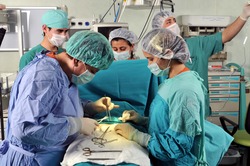
How many people know that medical device salespeople often participate in surgical procedures?
Surgeons, surgical nurses, and medical device manufacturers certainly do, but the general public does not. Allowing healthcare industry representatives (HCIR) to provide advice in operating rooms and guide surgeons’ actions has been an accepted practice in hospitals across the country for many years. It is especially common in spinal surgeries and those involving complete joint replacements.
There have long been concerns about this practice, which has resulted in numerous medical malpractice lawsuits. In response, the American College of Surgeons (ACS) Committee on Perioperative Care has released a revised statement addressing the issue of health care representatives in the operating room. In the words of the Committee, the purpose of the statement is to:
“ensure optimal surgical outcomes, to ensure patient safety, and to protect patients’ rights to privacy and confidentiality when an HCIR is present during a surgical procedure.”
In many hospitals, the presence of HCIRs in the operating room has been left up to individual surgeons. While ACS recommends that surgeons retain this authority, the organization recommends that health care institutions establish some ground rules for the presence of HCIRs in the operating room. Some of the most important of these are:
- Establishment of an authority within the hospital to vet and approve the presence of individual HCIRs.
- Verify that HCIRs have been trained in matters involving Health Insurance Portability and Accountability Act (HIPAA) compliance, pathogen and infectious disease control, aseptic principles and sterile techniques, safety standards for biohazardous waste handling and disposal, and others.
- Ensure that the HCIR is introduced to all members of the surgical team and that the HCIR’s role in the procedure is clearly explained.
- Ensure that the patient is informed of and approves the presence of the HCIR.
Furthermore, the Committee recommends that HCIRs be forbidden to engage in surgery, nursing or medical decision making.
Hopefully, hospitals throughout Illinois and across the country will adopt these standards and strictly adhere to them. If they don’t, we can expect additional adverse medical outcomes due to failure to meet the expected standard of care in operating rooms.

